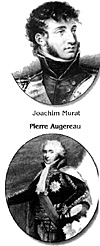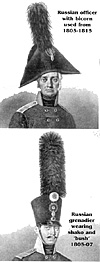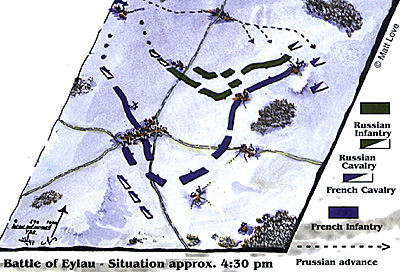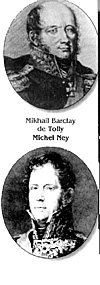 A few hundred rallied soldiers of Augereau's Corps to the right of the cemetery. The remains of Murat's cavalry take its place in the line like common foot soldiers between Augereau and St. Hilaire, now licking his wounds. There was nothing else to full the gap. Soult to hold on, though perhaps a third of his men out of action. The Guard, 3,000 men were now the only reserve. No sign of Ney.
A few hundred rallied soldiers of Augereau's Corps to the right of the cemetery. The remains of Murat's cavalry take its place in the line like common foot soldiers between Augereau and St. Hilaire, now licking his wounds. There was nothing else to full the gap. Soult to hold on, though perhaps a third of his men out of action. The Guard, 3,000 men were now the only reserve. No sign of Ney.
Davout. Thank God for III Corps. Could Davout save the day? Napoleon prayed that he could. Meanwhile, he ordered an aide, Jomini, to make secret arrangements for a possible retreat that evening at 10pm.
Once his troops were up, Davout had launched his battalions forward in the bitter cold and blinding snow, but the powerful Russian artillery had smothered his attacks. He used the time to forge a battleline instead. Morand's division on the left, Gudin in the center, Friant on the right. His light cavalry beyond that to oppose any moves made by the ever watchful Cossacks. Linking up with St. Hilaire, Morand now pushed forward in the teeth of the Russian guns and took 30 cannon at the point of the bayonet. As the infantry staggered forward, Korffs Russian cavalry suddenly burst through the snow at them. They reeled back before the horsemen until Klein's dragoons counter-charged to restore the situation, the riders now haggard and bloody, their mounts exhausted. Davout WILLED his troops forward.
"Sire!" he had said to his Emperor, "The 3rd Corps will be to your Majesty as the 10th Legion was to Caesar."
 The Russian infantry counter-attacked viciously, but Davout's marching volleys blew them back. The conscripts blazed away as the veterans re-loaded and passed the muskets forward. The noise was hellish: the dull thump of artillery in the background, the howl of the wind, the spiteful unceasing crackle of musketry, Friant finally rushed Klein-Sausgarten, was repulsed and took it
again with reinforcements. The Russians here fought like maniacs their officers leading them repeatedly to the charge with their barbarian "Hourrah!" The French doggedly stood their ground and poured volleys into the mass and advanced over the human wreckage. Though Bennigsen was
anxiously sending more and more reinforcements from his center and right to bolster his left, his flank was being slowly prised back by the sheer willpower of the irresistable 3rd Corps and their implacable commander.
The Russian infantry counter-attacked viciously, but Davout's marching volleys blew them back. The conscripts blazed away as the veterans re-loaded and passed the muskets forward. The noise was hellish: the dull thump of artillery in the background, the howl of the wind, the spiteful unceasing crackle of musketry, Friant finally rushed Klein-Sausgarten, was repulsed and took it
again with reinforcements. The Russians here fought like maniacs their officers leading them repeatedly to the charge with their barbarian "Hourrah!" The French doggedly stood their ground and poured volleys into the mass and advanced over the human wreckage. Though Bennigsen was
anxiously sending more and more reinforcements from his center and right to bolster his left, his flank was being slowly prised back by the sheer willpower of the irresistable 3rd Corps and their implacable commander.
Russian officer with bicorn 1805-15 and Russian grenadier with shako and 'bush' 1805-7
While Davout was hauling his cannon up into Kreegeburg to sweep the Russians before him and enfilade their center, Napoleon was beginning to recover his nerve. At three o'clock, while the slaughter continued around him, he retired for cold meat and a glass of wine. He had taken a tremendous hammering during the morning, but he had never once lost the initiative. Bennigsen simply ordered away his dwindling reserves to wherever they were needed. Murat's attack had shaken not only his centre but his nerve as well, and the French artillery, though outnumbered, were working terrible execution on the exposed Russian formations. Davout was soaking up the remaining reserves, and continued to push in his left flank. The Russian rear was filling up with stragglers, wounded, and fugitives.
Suddenly, one of Gudin's battalions was in the Anklappen farmstead. Driven out, the immediately returned to the attack. Muskets protruding from windows were grabbed, volleys discharged at 6 feet, and fists and bayonets used. The French gained possession and minutes later, the village of Kuschitten fell to them too. The Cossocks prowling to the far left of the Russian line were firmly checked by Davout's chasseurs, in action since dawn.
 Now Milhaud's dragoon division, sent from the center, finally drove the off for good. It was now 5pm. Davout it seemed, had rolled up the Russian left and the Russians were beginning to fall apart.
Now Milhaud's dragoon division, sent from the center, finally drove the off for good. It was now 5pm. Davout it seemed, had rolled up the Russian left and the Russians were beginning to fall apart.
While Soult's men gritted their teeth and stood their ground, Lasalle's light cavalry division had been entertained by a half-hearted attack from Markov's cavalry. Without deigning to counter charge, the French horsemen dressed their lines, aimed carbines over their horses' heads, and broke the Russian charge at ten yards' range. Towards late afternoon, they began feeling to their left to make contact with Ney. With the Russian left bent back so far and their centre and right so drastically weakened during the day to fend off Davout's quickening offensive, Napoleon now imagined Ney arriving in Bennigsen' s rear to annihilate his wavering army. But his orders to that Marshal, had only been dispatched that morning. On top of that, they had been delayed, and Ney only received them sometime after noon, when dark masses of troops were finally discerned approaching Althof--but it was not Ney, but the Prussian Lestocq at the head of his tattered but hard-fighting Germans.
Bennigsen shepherded them across the rear of his army, directing Lestoc to his ailing left flank. In their compact columns, the Prussians marched past wounded Russian infantrymen, riderless horses, abandoned vehicles and groups of hatless deserters. Some of them rallied and fell in behind Lestocq's army of 7,000 or so. The proud Germans, burning to avenge Jena-Auerstadt, fell on Kuschitten, encicling and wiping out 300-400 French defenders.
Even Davout's heroes could not withstand the onslaught of yet more fresh troops, and sullenly gave way before the advancing Prussians. The battle now rolled back again through the snow laden birch woods around Ankleppen, while its farm, now ablaze, fell to a fresh Russian attack. Davout rode frantically along his line, shouting encouragement to the soldiers of his battered divisions. Collecting all avallable artillery south of the Ankleppen Wood, he began to cobble together a new defensive line.
When the Prussians emerged from the trees to dress their lines, they were met by a solid wall of fire. As night began to fall, the exchange of musketry began to subside. Both sides, having fought to a standstill, dropped to the ground and began to light campfires where they lay, with or without orders. Sporatic exchanges of musketry continued until late, but there were no more attacks. Soon, Davout's cannon also fell silent and by 10pm, the battle of the French right was over.
 4pm: Ney
4pm: Ney
Some time after 4 o'clock, a corporal of voltigeurs in Ney's VI Corps ran back from a little snow-covered hillock to Ney.
de Tolly (top) and Ney
"Sir, there's one hell of a battle going on over there." Ney jumped a hedge to see for himself, and by six o'clock his forward batteries were in action before Althof. Napoleon was overjoyed, but it was already dark when Ney's grenadiers stormed the bridge there and advanced to the assault of Schloditten. He had been in touch with Lestocq and his Prussians all the way to the battlefield, but now it was Russians who advanced wearily to oppose him. With the leading brigade of his Corps, and supported by Lasalle's light cavalry, Ney seized Schloditten in the face of fierce resistance. The French found the place to be full of wounded and dying Russians. Bennigsen scraped up a regiment to re-take it after a preliminary bombardment in which only the flashes of the guns could be seen in the gloom. But Ney's men received the attack with a series of withering volleys. Along the rest of the line, by the Emperor's orders campfires were being lit to celebrate the victory, but no one was fooled. With night fallen, the battle obviously over, Ney saw no point to holding on to Schloditten and withdrew his Corps once more to Althof. In the small hours of the night, the Russians re-entered it.
More Eylau
-
Introduction
10am
Charge of Murat
12 Noon
11pm
Eylau Order of Battle
Eylau Map Large (very slow: 245K)
Eylau Map Jumbo (extremely slow: 406K)
Back to Age of Napoleon 29 Table of Contents
Back to Age of Napoleon List of Issues
Back to MagWeb Master List of Magazines
© Copyright 1998 by Partizan Press.
This article appears in MagWeb (Magazine Web) on the Internet World Wide Web.
Other military history articles and gaming articles are available at http://www.magweb.com